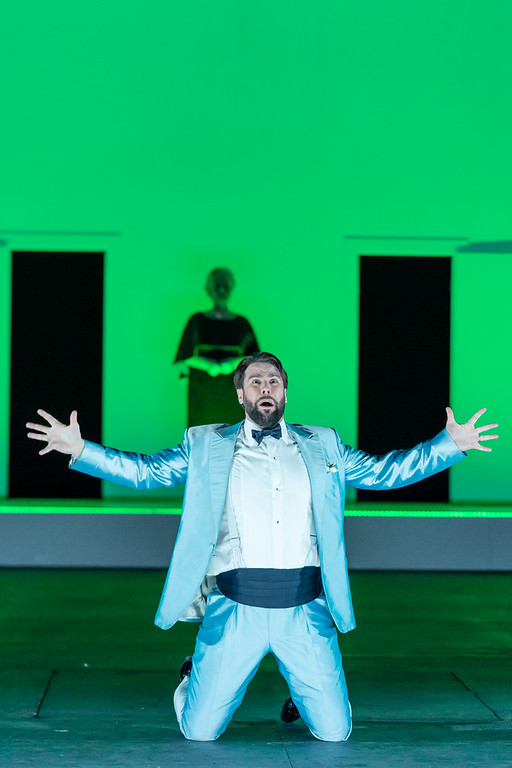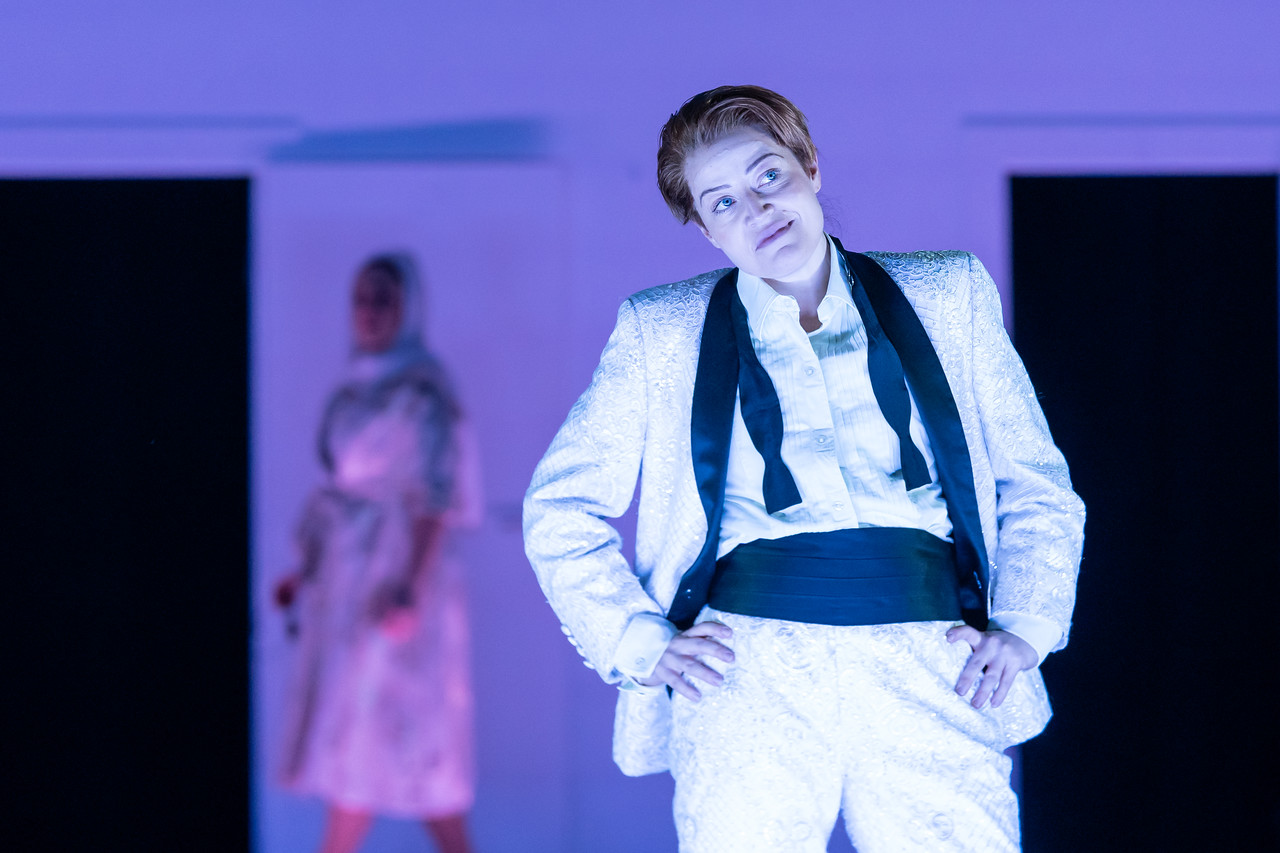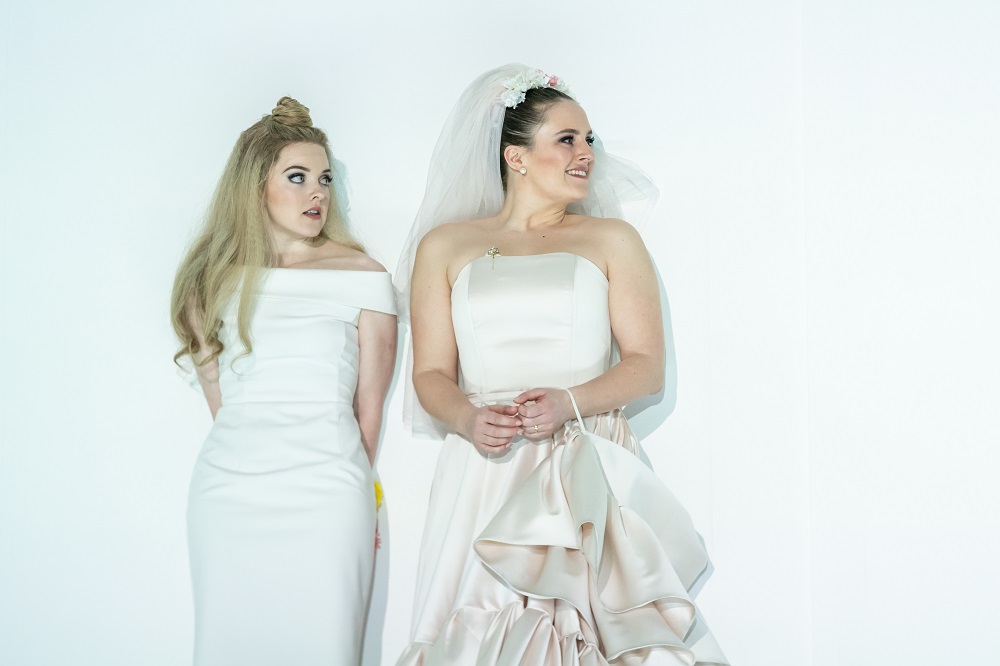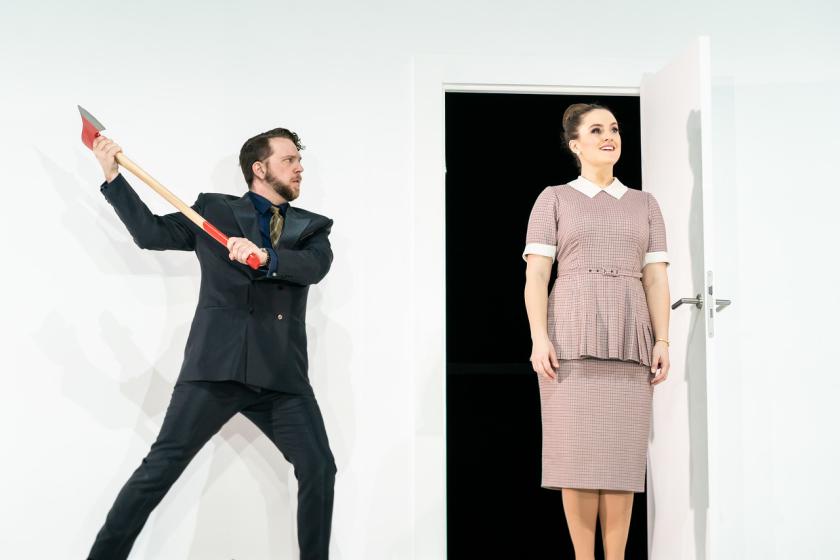So Susanna and Figaro got married on Saturday, just before the entire Almaviva household and its home, the London Coliseum, went into quarantine. Let's at least celebrate the fact that these splendid singer-actors, with youth especially on the five main principals' side, saw so much hard work on forging an ensemble and co-ordinating as best they could with conductor Kevin John Edusei in the Coliseum's big, Mozart-unfriendly space come to fruition, if only for one night.
Director Joe Hill-Gibbins, a genuinely original force in theatre whose Edward II at the National shook up the literalism of the middle-Engliand-friendly Hytner regime, has clearly put in so many hours on forging gesture and meaning, with what would seem like equal labour from choreographer Jenny Ogilvie. The Overture is a brilliantly precise statement of dramatic intent to match the crisp, fizzing work of the ENO Orchestra under Edusei; well-timed exits and entrances through the four doors on the plain-whiite box marry with comic attitudes struck against the walls. Throughout the evening, figures are always discovered poised against the black beyond - sometimes lurking to eavesdrop, more often to back up the meaning of characters' aria-monologues in a fantasy dimension.
 There's real individual consistency here, but it sees diminishing returns in terms of the deepening human perspectives Mozart and Da Ponte, faithful to the Beaumarchais original, unfurl in the long and detailed drama. The two main couples keep up the energy levels splendidly, razor-sharp and dropping naturalistically into speech at times in the recitatives which come across so brilliantly in yet another adaptation of Jeremy Sams's ever-vivid translation, but when it comes to the four main arias distributed through the last two acts, only Louise Alder as Susanna realises both vocal and emotional possibilities. Johnathan McCullough's Count, so good at the exaggerated comic gestures, feels a bit diminished in his soliloquy of explosive rage by the lustful tableaux he discovers behind every door. It may well be Mozart's fault that Figaro's jealous diatribe against women is the least memorable of the big set-pieces, but I've seen it delivered with more anguished edge than it got from Božidar Smiljanić (pictured above in Act Four with Susan Bickley), otherwise a big and sympathetic presence.
There's real individual consistency here, but it sees diminishing returns in terms of the deepening human perspectives Mozart and Da Ponte, faithful to the Beaumarchais original, unfurl in the long and detailed drama. The two main couples keep up the energy levels splendidly, razor-sharp and dropping naturalistically into speech at times in the recitatives which come across so brilliantly in yet another adaptation of Jeremy Sams's ever-vivid translation, but when it comes to the four main arias distributed through the last two acts, only Louise Alder as Susanna realises both vocal and emotional possibilities. Johnathan McCullough's Count, so good at the exaggerated comic gestures, feels a bit diminished in his soliloquy of explosive rage by the lustful tableaux he discovers behind every door. It may well be Mozart's fault that Figaro's jealous diatribe against women is the least memorable of the big set-pieces, but I've seen it delivered with more anguished edge than it got from Božidar Smiljanić (pictured above in Act Four with Susan Bickley), otherwise a big and sympathetic presence.
The usually wonderful Elizabeth Watts, formerly a Susanna-light soprano who's now taken on more vocal weight, wasn't at ease on Saturday night with portraying a pained Countess who never gets to share in the fun, as she so often does; her upper-register crack in the bigger of her two arias wouldn't have mattered had it not seemed part of an angst detectable in the singer as well as the character. You also felt that Edusei wanted to give the lyric-melancholy moments more space than Hill-Gibbins' attitudes often allowed, though there was some brilliant string playing in the second and fourth act finales, and warm, personable woodwind delivery.  For broad comedy we had Hanna Hipp's Cherubino, who could have done with a trendier hairdo since "he" seems so concerned about it - better looks overall in Act Four (pictured above) - and whose serenade, a nifty dance routine shared by Susanna and the Countess, didn't have room for the off-kilter confusion Mozart builds into its wayward progress, but who still got plenty of laughs and had a delicious upper-register lustre. Susan Bickley made high comic style out of randy older woman Marcellina, but the humorous brushstrokes were a bit too thick from Andrew Shore's Bartolo, Clive Bayley's Antonio and Colin Judson's Basilio (and do we really still need the comic stutter of Curzio, his other role?) The Act Three Sextet consolidating absurd revelations lacked its usual glow of warm humanity.
For broad comedy we had Hanna Hipp's Cherubino, who could have done with a trendier hairdo since "he" seems so concerned about it - better looks overall in Act Four (pictured above) - and whose serenade, a nifty dance routine shared by Susanna and the Countess, didn't have room for the off-kilter confusion Mozart builds into its wayward progress, but who still got plenty of laughs and had a delicious upper-register lustre. Susan Bickley made high comic style out of randy older woman Marcellina, but the humorous brushstrokes were a bit too thick from Andrew Shore's Bartolo, Clive Bayley's Antonio and Colin Judson's Basilio (and do we really still need the comic stutter of Curzio, his other role?) The Act Three Sextet consolidating absurd revelations lacked its usual glow of warm humanity.
Alder, though, is a dream Susanna, winning us over immediately with her confidential reactions, naturalnes and vocal warmth; Rowan Pierce, young Barbarina whose innocence is stolen too soon by her lecherous master (pictured below with Alder), will step up to the role anon.  They and the rest of the cast tried their best to be always in sych with Edusei and the orchestra, but weren't always helped by the way the single room of Johannes Schütz's simple set design sometimes rose - not so cheap, then - to put them at a greater distance, for no especially good reason that could be detected other than to give Cherubino a mattress on which to fall - hardly a tumble into geraniums - in Act Two and a vague sense of servants below. You guessed it would sllde back for the garden-in-the-dark last act, with bold but not always fathomable lighting (the red?) from Matthew Richardson. Ultimately it was hard to love rather than just like this Figaro; but top marks for ambition, strong casting and tirelessly ingenious execution; there's definitely more to relish here than could be encompassed in a middle-of-the-road three-star rating.
They and the rest of the cast tried their best to be always in sych with Edusei and the orchestra, but weren't always helped by the way the single room of Johannes Schütz's simple set design sometimes rose - not so cheap, then - to put them at a greater distance, for no especially good reason that could be detected other than to give Cherubino a mattress on which to fall - hardly a tumble into geraniums - in Act Two and a vague sense of servants below. You guessed it would sllde back for the garden-in-the-dark last act, with bold but not always fathomable lighting (the red?) from Matthew Richardson. Ultimately it was hard to love rather than just like this Figaro; but top marks for ambition, strong casting and tirelessly ingenious execution; there's definitely more to relish here than could be encompassed in a middle-of-the-road three-star rating.














Add comment